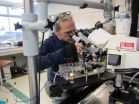(Press-News.org) Alpha viruses, such as Sindbis virus, carry their genetic information on a single strand of RNA. On infection they use a protein, replicase, to produce double stranded RNA (dsRNA) which is used as genetic material to make more viruses. However the body recognizes dsRNA as foreign, and infected cells initiate an immune response. New research published in BioMed Central's open access journal BMC Cancer demonstrates that an artificial plasmid coding for the replicase genes of Sindbis virus causes regression and destruction of lung cancer, or melanoma, cells in mice.
Previous attempts to use synthetic dsRNA to destroy tumor cells have met with problems, including side effects at an effective dose, but there are also concerns about using attenuated viruses, to deliver dsRNA inside cells. Researchers from the University of Texas at Austin have instead used a plasmid containing Sindbis replicase genes (nsp1-4) to force cells to produce dsRNA themselves.
For ten days mice were given daily injections of plasmid into the site of a tumor. After another 15 days most of the tumors had begun to regress, and by day 37 all of the tumors had either regressed or been destroyed. Professor Cui said, "The anti-cancer action of the plasmid seemed to be two-fold. Firstly accumulation of dsRNA resulted in cell death and secondly the presence of dsRNA, and the foreign, unmethylated, plasmid DNA, inside a cell activated both innate and adaptive immune responses."
Professor Cui continued, "In our study both highly immunogenic and poorly immunogenic tumors were receptive to treatment with an RNA replicase based plasmid. Our results suggested a novel approach to cancer molecular therapy."
###
Notes to Editors
1. Replicase-based plasmid DNA shows anti-tumor activity
B. Leticia Rodriguez, Zhen Yu, Woon-Gye Chung, Richard Weiss and Zhengrong Cui
BMC Cancer (in press)
Please name the journal in any story you write. If you are writing for the web, please link to the article. All articles are available free of charge, according to BioMed Central's open access policy.
Article citation and URL available on request at press@biomedcentral.com on the day of publication.
2. BMC Cancer is an Open Access, peer-reviewed journal that considers articles on all aspects of cancer research, including the pathophysiology, prevention, diagnosis and treatment of cancers. The journal welcomes submissions concerning molecular and cellular biology, genetics, epidemiology, and clinical trials.
3. BioMed Central (http://www.biomedcentral.com/) is an STM (Science, Technology and Medicine) publisher which has pioneered the open access publishing model. All peer-reviewed research articles published by BioMed Central are made immediately and freely accessible online, and are licensed to allow redistribution and reuse. BioMed Central is part of Springer Science+Business Media, a leading global publisher in the STM sector.
Viral replicase points to potential cancer therapy
2011-03-28
ELSE PRESS RELEASES FROM THIS DATE:
Kidobi and MrsP.com Announce New Content Partnership
2011-03-28
Kidobi and MrsP.com announced today a new content distribution partnership, which adds Mrs. P Presents' titles The Tale of Peter Rabbit and The Princess and the Pea to Kidobi's growing library of digital videos for preschool-aged children.
"Kidobi and Mrs P. share the same philosophy about providing an ad free and safe place for children to play and learn on the Internet," said Leo Henning, President of Kidobi. "We are proud to partner with MrsP.com, which received the American Library Association honor 'great site for kids'."
Mrs. P, played by actress Kathy Kinney, ...
A possible new target for treatment of multiple sclerosis
2011-03-28
The immune system recognizes and neutralizes or destroys toxins and foreign pathogens that have gained access to the body. Autoimmune diseases result when the system attacks the body's own tissues instead. One of the most common examples is multiple sclerosis (MS). MS is a serious condition in which nerve-cell projections, or axons, in the brain and the spinal cord are destroyed as a result of misdirected inflammatory reactions. It is often characterized by an unpredictable course, with periods of remission being interrupted by episodes of relapse. A team of researchers ...
From candy floss to rock: study provides new evidence about beginnings of the solar system
2011-03-28
The earliest rocks in our Solar System were more like candy floss than the hard rock that we know today, according to research published today in the journal Nature Geoscience.
The work, by researchers from Imperial College London and other international institutions, provides the first geological evidence to support previous theories, based on computer models and lab experiments, about how the earliest rocks were formed. The study adds weight to the idea that the first solid material in the Solar System was fragile and extremely porous – much like candy floss – and ...
Structure of DNA repair complex reveals workings of powerful cell motor
2011-03-28
LA JOLLA, CA – Over the last years, two teams of researchers at The Scripps Research Institute have steadily built a model of how a powerful DNA repair complex works. Now, their latest discovery provides revolutionary insights into the way the molecular motor inside the complex functions – findings they say may have implications for treatment of disorders ranging from cancer to cystic fibrosis.
In a paper published in an Advance Online Edition of Nature Structural and Molecular Biology March 27, 2011, the scientists say that the complex's motor molecule, known as Rad50, ...
Will we hear the light?
2011-03-28
SALT LAKE CITY, March 28, 2011 – University of Utah scientists used invisible infrared light to make rat heart cells contract and toadfish inner-ear cells send signals to the brain. The discovery someday might improve cochlear implants for deafness and lead to devices to restore vision, maintain balance and treat movement disorders like Parkinson's.
"We're going to talk to the brain with optical infrared pulses instead of electrical pulses," which now are used in cochlear implants to provide deaf people with limited hearing, says Richard Rabbitt, a professor of bioengineering ...
WinADayCasino's Game of the Month Has $165,900 Jackpot Winner
2011-03-28
A Canadian online slots player has won a $165,900 progressive jackpot at WinADayCasino.com. Sylvia M., known as POWERBALL on the site, won the massive jackpot playing the Tropical Treat slot machine, one of the online casino's newest flash technology games with enhanced full-screen graphics and rich sound effects.
"The progressive jackpot can be won on any of our online slots," said Michael Hilary, manager of the slots and video poker site. "But since it's been the Game of the Month for March and has been played more than usual over the last few weeks, I guess it's ...
Surgeon availability tied to survival rate in vehicle crashes
2011-03-28
Researchers at the University of California, San Diego School of Medicine claim that the availability of surgeons is a critical factor in public health and suggest that surgery should become an important part of the primary health care system.
A recent study led by David C. Chang, PhD, MPH, MBA, director of Outcomes Research in the Department of Surgery at UCSD School of Medicine, points out that surgery in the United States continues to be seen as tertiary care and is mainly centered at large urban hospitals, creating an unequal distribution of surgical providers. The ...
Study finds changes in incidence of end-stage renal disease from lupus nephritis
2011-03-28
New research documenting changes in the incidence and outcomes of end-stage renal disease (ESRD) in the U.S. between 1995 and 2006, found a significant increase in incidence rates among patients 5 to 39 years of age and in African Americans. A second related study—the largest pediatric lupus nephritis-associated ESRD study to date—revealed high rates of adverse outcomes among children with ESRD due to lupus nephritis. Despite novel therapies, outcomes have not improved in over a decade. Both studies now appear online in Arthritis & Rheumatism, a journal published by Wiley-Blackwell ...
Certain breast cancer patients worry excessively about recurrence
2011-03-28
A new study has found that certain types of women with early stage breast cancer are vulnerable to excessive worrying about cancer recurrence. Published early online in CANCER, a peer-reviewed journal of the American Cancer Society, the study also indicates that worrying about cancer recurrence can compromise patients' medical care and quality of life.
Thanks to recent medical advances, most women who are diagnosed with early stage breast cancer have a low risk for cancer recurrence. Despite an optimistic future, many of these women report that they worry that their ...
Some women worry too much about breast cancer returning, U-M study finds
2011-03-28
ANN ARBOR, Mich. — Most women face only a small risk of breast cancer coming back after they complete their treatment. Yet a new study from the University of Michigan Comprehensive Cancer Center finds that nearly half of Latinas who speak little English expressed a great deal of worry about recurrence.
"Some worry about cancer recurrence is understandable. But for some women, these worries can be so strong that they impact their treatment decisions, symptom reporting and screening behaviors, and overall quality of life," says study author Nancy K. Janz, Ph.D., professor ...

